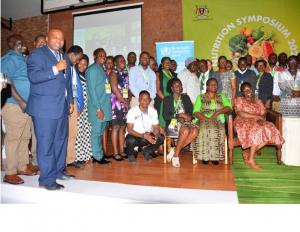Uganda Government, stakeholders root for improved nutrition
Uganda's Ministry of Health (MOH), with support from World Health Organization (WHO) and other partners organized a three-day annual nutrition symposium (15–17 February 2023) in Kampala, focusing on the systems approach for improving nutrition service delivery and outcomes in Uganda.
During the symposium, nutrition stakeholders shared their experiences, innovations, research findings, and lessons learned from projects impacting nutrition programming. The symposium discussions emphasized the need to tackle malnutrition in Uganda by addressing the multiple risk factors related to food, care, health, and the environment.
Malnutrition, in all its forms, poses significant threats to human health by increasing the risk of disease and leading to poor growth, intellectual impairments, perinatal complications, and increased risk of morbidity and mortality. Poor diet and non-communicable diseases (NCDs) account for 26% of deaths among adults around the world.
The symposium was held at time when nutrition situation in Uganda indicated unacceptable levels of malnutrition. According to the 2016 Uganda Demographic Survey, stunting among children is at 29%, wasting is 4% while underweight accounts for 11% of children in Uganda. Twenty four percent of women and 9% of men aged 15-49 in Uganda are overweight or obese. The prevalence of hypertension and diabetes among adults is gradually increasing over the years with women having a higher prevalence of 27.7% and 4.7% as compared to males with 26.7% and 4.4% respectively. Currently, 33% of annual deaths in Uganda are attributed to the five leading NCDs: cardio-vascular diseases, cancers, diabetes, chronic respiratory diseases, mental health disorders and substance abuse.
The symposium accorded stakeholders an opportunity to showcase their work, innovations, and other initiatives toward improved nutrition and a healthy lifestyle.
“Uganda has registered some achievements, but the challenges need nutrition stakeholders to bridge the gap by strengthening policies and partnerships at all levels, recruiting nutrition cadres to district and health facility level and ensuring equitable food supply," said Hon. Margaret Muhanga, Minister of State for Primary Health Care, who was the chief guest.
WHO and its partners called for increased domestic financing for nutrition, deliberate promotion of nutrition-specific and nutrition-sensitive interventions, better coordination and harmonization between sectors focusing on nutrition data collection, analysis, and reporting.
“We are promoting consumption of healthy diets, food security and safety, ensuring that food is safe from adulteration, contamination with pathogens (including zoonoses and anti-microbial strains), chemicals, and intoxicants,’’ said Dr. Kenneth Mutesasira, Technical Officer (Quality of Care Specialist) at WHO Uganda.
In response to food insecurity in Karamoja, the Sudan ebolavirus disease outbreaks, and the COVID-19 pandemic, WHO and the Uganda Ministry of Health mobilized resources for nutritional support.
The Nutrition Symposium drew participants from Government ministries, departments and agencies (MDAs), donor agencies, civil society organisations, implementing partners and and UN agencies.
Communications Associate
WHO Uganda Country Office
Email: afwcougcom [at] who.int (afwcougcom[at]who[dot]int)
Phone: +256740487734
Communications Officer
WHO Uganda
Email: tcheutchouae [at] who.int (tcheutchouae[at]who[dot]int)



